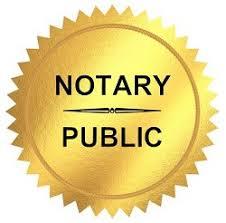Debunking Notarial Work: Simplifying the Duty and Importance of Notaries
In the intricate web of lawful paperwork and confirmation, notaries stand as columns of guarantee and credibility. Their function, often shrouded in secret for many, carries significant weight in making certain the validity and integrity of crucial papers. As guardians of legality and reality, notaries play a pivotal part in our society, yet their work is not always fully recognized. By deciphering the complexities bordering notarial methods and losing light on the value of their acts, a more clear understanding arises of the essential duty notaries play in upholding the material of contractual and legal contracts.
The Background of Notarial Work
The background of notarial work dates back to old worlds, where scribes played a crucial duty in taping vital information and verifying records. This led to the advancement of notaries, people selected by the state to act as impartial witnesses in lawful issues.
During the Center Ages, notaries got importance in Europe, with their features broadening to include preparing lawful papers, licensing trademarks, and protecting records. The surge of international trade additionally emphasized the significance of notarial work in verifying contracts and agreements across borders.
In the contemporary period, notaries proceed to play an important role in lawful and service transactions by confirming identities, verifying the authenticity of papers, and stopping scams. Their function in accrediting the legitimacy of contracts includes a layer of safety and security and depend on to the ever-evolving landscape of commerce and legislation.

Duties and Obligations of Notaries
Notaries play a vital duty in verifying the credibility of papers and the identity of signatories. One of their key obligations is to witness the signing of important documents, such as agreements, wills, and acts, to guarantee that all celebrations are entering right into arrangements intentionally and willingly.
Additionally, notaries are tasked with providing oaths and affirmations, which are critical in legal procedures and the implementation of sworn statements. They certify duplicates of initial papers, offering assurance to organizations that the copies hold true replicas of the originals. Notaries should keep accurate documents of all purchases they supervise to make sure openness and liability. Overall, the responsibilities and responsibilities of notaries are necessary in protecting the honesty and validity of different records and transactions.
Notarial Certificates and Signatures
Exemplifying thorough focus to detail, notarial certifications and trademarks act as vital elements in confirming the credibility of lawful webpage papers. Notarial certificates usually include important info such as the date of registration, the names of the signatures, a summary of the document, and the notary's official seal. These certificates offer a clear document of the notarial act, making sure that the paper can be quickly identified and traced back to the notary who oversaw the procedure.
Signatures play a critical role in notarial work, as they symbolize the agreement and consent of the parties involved. Notaries thoroughly witness the finalizing of records to verify the identification of the notaries and verify that they are authorizing of their own free choice. By attaching their main seal and signature to the paper, notaries certify that the required treatments have been adhered to and that the file is valid and enforceable.
Fundamentally, notarial certifications and trademarks are the hallmark of credibility in lawful purchases, giving assurance to all events entailed that the documents are legit and binding.
Relevance of Notarial Acts

Registration Process Discussed
The notarization process generally begins with the private offering the paper to a notary public. When the identification is validated, the notary makes certain that the specific authorizing the document does so voluntarily and without any browbeating.

Verdict

Notarial certificates usually have vital details such as the date of registration, the names of the signatures, a description of the paper, and the notary's main seal. These certificates offer a clear document of the notarial act, ensuring that the file can be quickly recognized and traced back to the notary that managed the procedure.
By fastening their main seal and signature to the file, notaries certify that the required procedures have actually been complied with and that the file is valid and enforceable.
By confirming the identification of the signatories, validating their readiness to enter right into the contract, and certifying the day and place of the signing, notaries play a vital function in upholding the validity Visit Website of lawful records.After the paper is signed, the notary will certainly affix their main seal or stamp onto the document.